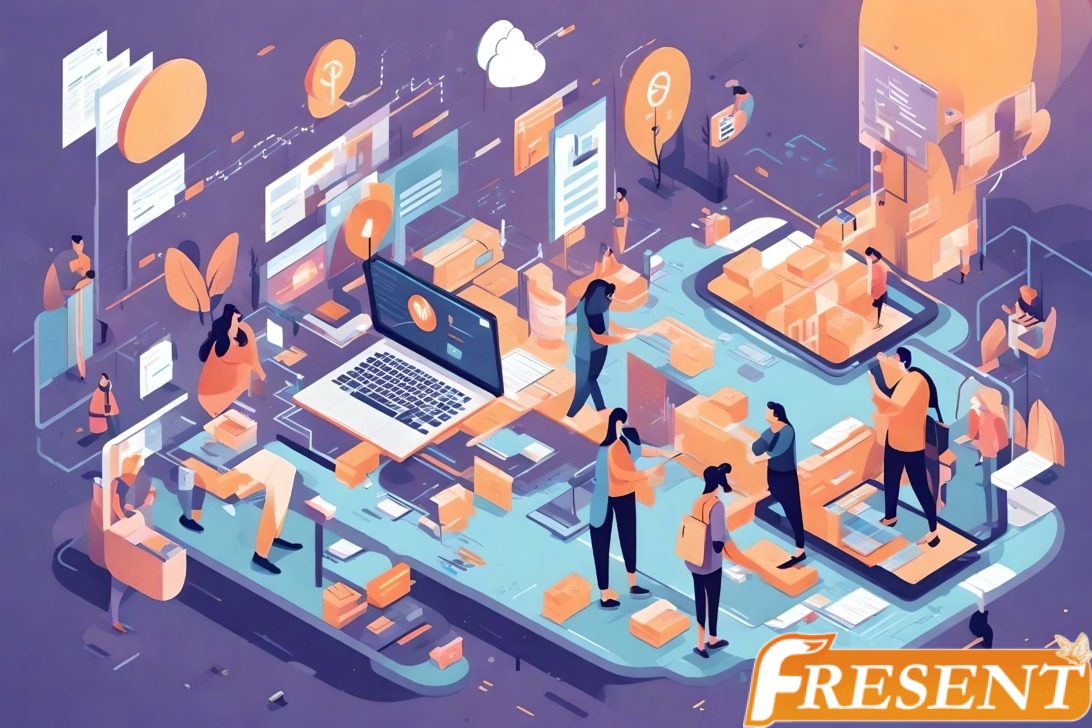The gig economy has become a buzzword in recent years, with many people turning to freelance work as a way to make ends meet. The rise of the gig economy has brought about new challenges and opportunities for both workers and employers. One of the key factors driving this trend is the increased use of Software as a Service (SaaS) platforms, which have become an essential tool for many gig workers.
While SaaS has undoubtedly empowered many gig workers by providing them with access to powerful tools and resources, it has also raised questions about exploitation and ethical considerations. In this article, we will explore the role of SaaS in the gig economy and examine its impact on workers’ mental health. We will also consider the broader implications of this trend for society as a whole, including how it may shape our understanding of work and employment in the future. Through data-driven analysis, we hope to provide readers with an objective assessment of the benefits and drawbacks associated with SaaS in the context of the gig economy.

Overview of the Gig Economy
The gig economy refers to a labor market characterized by short-term contracts and freelance work, where independent workers are paid for individual projects or tasks rather than holding traditional full-time employment positions. This type of work arrangement has become increasingly popular in recent years due to technological advancements and shifting attitudes towards work-life balance. However, the gig economy presents significant challenges for workers, such as lack of job security, benefits, and legal protections.
Gig workers’ rights have been a topic of debate in many countries as governments strive to ensure that these workers are not exploited. Many gig workers operate without legal protection and face challenges such as low wages, long working hours, and limited access to healthcare. In response to these issues, some countries have introduced legislation aimed at protecting gig workers’ rights such as minimum wage laws, social security contributions requirements among others.
Considering the challenges faced by gig economy participants regarding their rights and welfare brings about an evaluation of software as a service (SaaS). SaaS is an innovative technology that has played a significant role in empowering independent workers by providing them with tools necessary for effective project management – this will be discussed in detail in subsequent sections.
What is Software as a Service (SaaS)?
Software as a Service, also known as SaaS, is a model of delivering software applications through the internet rather than installing and maintaining them on local computers. It is a cloud-based solution that provides access to various software programs through subscription fees paid by users. In the gig economy, where freelancers and independent contractors work on short-term projects for different clients, SaaS has become an essential tool for managing their work.
The benefits of SaaS in the gig economy are numerous. Firstly, it enables remote collaboration and communication between workers and clients in real-time. Secondly, it eliminates the need for expensive hardware and software upgrades that traditional software requires. Thirdly, it offers flexibility in terms of scalability since users can adjust their subscriptions according to their changing business needs. However, there are some limitations to SaaS adoption for gig workers such as data security concerns and dependence on stable internet connectivity.
Despite these challenges, the adoption of SaaS in the gig economy is increasing rapidly due to its many advantages. This technology has transformed how businesses operate by providing affordable access to advanced tools previously out of reach for small firms or individual entrepreneurs. As we explore further into this topic’s importance section about ‘the role of saas in the gig economy: empowerment or exploitation?’, we will examine how this technology empowers gig workers while also raising questions about ethical considerations within this new work environment.
Importance of SaaS in the Gig Economy
In the digital age, SaaS technology can be likened to a key that unlocks the door to numerous possibilities for gig workers seeking to streamline their workflow and increase productivity. By providing access to a wide range of software applications through the cloud, SaaS technology enables gig workers to perform their tasks more efficiently and effectively. This improved efficiency not only benefits gig workers but also empowers them financially by enabling them to complete more work in less time.
SaaS solutions provide immense value to gig economy businesses as they allow organizations to scale operations without significant upfront costs. Instead of purchasing expensive software licenses or hardware, companies can subscribe on-demand services from SaaS providers based on their needs. Moreover, SaaS vendors continuously update their offerings with new features and capabilities without requiring any additional investment from users.
Overall, it is clear that SaaS plays an important role in empowering gig workers by improving efficiency and financial stability. As we will explore further in subsequent sections, this empowerment has led some experts to argue that the use of SaaS represents a positive trend in the evolution of the gig economy towards more equitable working conditions for all parties involved.

Empowering Gig Workers with SaaS
By utilizing SaaS technology, gig workers can optimize their workflow and increase efficiency in a cost-effective manner. Saas tools for productivity such as project management software, communication tools, and time-tracking apps can help gig workers manage multiple clients and tasks simultaneously. These tools allow them to stay organized, prioritize tasks, and track their progress efficiently.
Furthermore, SaaS for gig worker training can provide access to educational resources that enable them to enhance their skills and improve their overall performance. Online courses and tutorials on various topics such as marketing strategy, social media management, or website development can be accessed easily through SaaS platforms. These resources not only improve the quality of work but also open up opportunities for more profitable gigs.
The use of SaaS in the gig economy empowers workers by providing them with essential tools for productivity and access to training resources that enhance their skills. The adoption of these technologies enables gig workers to maximize efficiency while minimizing costs. However, it is important to note that despite its benefits, there are potential risks associated with the use of these platforms which may lead to exploitation of workers that will be discussed further in the subsequent section about ‘exploitation of gig workers through saas.
Exploitation of Gig Workers through SaaS
The pervasive nature of SaaS in the gig industry has brought to light the alarming issue of workers being subjected to exploitative practices, leaving them with little agency and bargaining power in a market that values efficiency over human capital. Gig workers are particularly vulnerable to economic inequality because they lack benefits such as health insurance, retirement plans, and paid time off. They also face unpredictable work schedules, low wages, and no job security.
SaaS platforms have been accused of exacerbating these issues by perpetuating a race-to-the-bottom mentality among employers who compete on price rather than quality. This leads to an oversupply of labor and puts downward pressure on wages. Moreover, the use of algorithmic management systems further erodes worker autonomy by dictating when and where they work without regard for their preferences or needs.
As a result, some gig workers are forced to work long hours just to make ends meet while others suffer from burnout or leave the industry altogether. The impact of these exploitative practices on mental health is significant and will be discussed in the next section.
Impact of SaaS on Gig Workers’ Mental Health
The toll of SaaS on gig workers’ mental health is revealed by the ramifications of a system that prioritizes profit over well-being. As more and more companies turn to SaaS platforms to manage their workforce, gig workers are expected to be available 24/7, resulting in an erosion of work-life balance. This leads to increased stress, anxiety, and burnout among gig workers.
Mental health support is often lacking for gig workers. The freelance nature of the work means that many do not have access to traditional employee benefits such as healthcare or counseling services. Additionally, the relatively low pay and lack of job security can exacerbate financial stressors which further impact mental health.
To address these concerns, some SaaS platforms have started offering mental health resources such as online therapy sessions or self-care tools. However, these efforts may fall short if they are not accompanied by changes in the overall structure and expectations of the gig economy. Companies must prioritize worker well-being over profits if they want to truly make a difference in supporting their workforce’s mental health.
As we consider the impact of SaaS on gig workers’ mental health, it is important to also examine ethical considerations surrounding this issue. The exploitation of vulnerable individuals through these platforms raises questions about responsibility and accountability within this industry. Moving forward, it will be essential for companies utilizing SaaS platforms in the gig economy to ensure that their practices align with ethical standards and prioritize worker well-being above all else.
Ethical Considerations
This discussion focuses on the ethical considerations related to SaaS in the gig economy. Two key issues that arise are fair wages and benefits, as well as transparency and accountability. The nature of gig work and the use of SaaS platforms often result in workers not receiving traditional employee benefits, which raises questions about fairness and equity. Additionally, there is a lack of transparency regarding how these platforms operate and how they determine worker pay, which can lead to feelings of exploitation among workers.
Fair Wages and Benefits
Fair wages and benefits are an ongoing concern in the gig economy, with many questioning the adequacy of compensation offered by SaaS platforms. The fair wages advocacy in the gig economy aims to ensure worker centric policies that provide adequate compensation for gig workers. Despite this advocacy, however, some SaaS platforms continue to offer low wages and limited benefits to their workers.
To address this issue, stakeholders have proposed several solutions that could help mitigate the problem of inadequate compensation in the gig economy. These include:
- Mandating minimum wage standards for gig workers.
- Offering health insurance and other benefits.
- Implementing a rating system that rewards high-performing workers with better pay and more opportunities.
- Providing training programs that allow workers to acquire new skills and earn higher wages.
Incorporating such measures into SaaS platforms can promote fairness in compensation, ensuring that gig workers receive adequate pay and benefits for their work. However, there is also a need for transparency and accountability on the part of these platforms regarding how they determine worker pay rates, as well as how they allocate profits generated through these services towards supporting worker welfare initiatives – a topic which will be discussed further in subsequent sections of this paper.
Transparency and Accountability
In addition to fair wages and benefits, another significant issue in the gig economy is transparency and accountability. The lack of transparency in algorithms used by gig platforms has been a subject of concern for workers, policymakers, and academics alike. Gig companies have kept their algorithms confidential, making it difficult for workers to understand how they are evaluated and compensated. This opacity can result in unfair treatment of workers as algorithmic decisions may not always be objective or unbiased.
Furthermore, data privacy and security are also vital concerns regarding gig work. Gig platforms collect vast amounts of data from workers, including personal information such as names, addresses, contact details, among others. These data are often stored on company servers that may be vulnerable to cyber attacks or misuse by third parties. Workers need assurance that their data is being handled securely and transparently by gig platforms.
Moving forward into the subsequent section about ‘support for gig workers,’ it is important to recognize that addressing these issues requires collective efforts from policymakers, employers, and worker organizations.
Support for Gig Workers
Assistance for gig workers is crucial in ensuring their wellbeing and productivity within the rapidly evolving landscape of the gig economy. Despite the flexibility and autonomy that comes with freelancing, many gig workers face challenges such as inconsistent earnings, lack of benefits, and limited access to legal protections. Therefore, it is essential for saas platforms to provide support mechanisms that cater to these needs.
One way that saas platforms can support gig workers is by offering tools for financial management. This includes features like automatic tax calculations, expense tracking, and invoicing software. Additionally, providing access to affordable healthcare plans or other benefits can help mitigate some of the risks associated with being a freelance worker. These measures can also increase job satisfaction among gig workers and contribute positively to their overall wellbeing.
While there are ongoing debates about whether the current structure of the gig economy exploits or empowers its workforce, it is clear that effective support mechanisms are essential in promoting a healthy working environment for freelancers. The future of saas in this context will depend on how well providers can integrate innovative solutions that address emerging challenges faced by gig workers while also ensuring sustainability and profitability in an increasingly competitive market.

Future of SaaS in the Gig Economy
Advancements in technology, changes in work culture, and sustainability and social responsibility are the key factors shaping the future of SaaS in the gig economy. Technological advancements like AI, machine learning, and big data analytics have already transformed the way businesses operate by providing them with crucial insights into customer behavior and market trends. Changes in work culture such as remote working and flexible hours have also contributed to the growing demand for SaaS solutions that enable efficient collaboration among distributed teams. Additionally, there is a growing need for sustainable and socially responsible solutions that prioritize the well-being of workers while ensuring business growth.
Advancements in Technology
Technological progress has transformed the gig economy, allowing workers to access a range of online platforms that match them with clients and jobs in various sectors. Technology’s influence on the gig economy has led to the adoption of Software as a Service (SaaS) solutions by both freelancers and businesses. SaaS solutions have become increasingly popular due to their flexibility, scalability, and affordability. However, there are challenges associated with SaaS adoption in the gig economy, such as security concerns, data privacy issues, and compatibility problems.
One sub-list within this topic is that advancements in technology have created new opportunities for freelancers who can now work remotely using cloud-based software tools. The use of these tools enables workers to collaborate with team members from different parts of the world without needing to be physically present in an office setting. Another sub-list is that SaaS platforms are also transforming how businesses operate by providing them with access to powerful digital tools like project management systems and customer relationship management software. These tools help businesses save time and money while also improving productivity and efficiency.
As technology continues to evolve rapidly, it will continue to shape the future of work in the gig economy. Changes in work culture will need to keep pace with technological advancements if we want our workforce to remain competitive globally.
Changes in Work Culture
Advancements in technology have had a profound impact on the way we work. With the rise of digital platforms, remote work has become increasingly popular, allowing employees to work from anywhere in the world. This shift has given rise to a new type of workforce that values flexibility and autonomy. As more people embrace this lifestyle, traditional office culture is becoming less relevant.
Remote work offers many benefits, including greater freedom and control over one’s schedule. Additionally, it can help prevent burnout by allowing workers to take breaks when they need them. However, it also requires a certain level of discipline and self-motivation to be successful. Therefore, while remote work may not be suitable for everyone, those who thrive in this environment find that it greatly enhances their work life balance.
As we move towards an increasingly interconnected global economy, sustainability and social responsibility are becoming ever more important.
Sustainability and Social Responsibility
With the world becoming more interconnected, businesses are now recognizing the importance of integrating sustainability and social responsibility into their operations. This shift is not only driven by consumer demand for eco-friendly products and services but also by the need to mitigate climate change’s adverse effects. Companies are implementing green initiatives such as reducing carbon footprint, using renewable energy sources, and minimizing waste production. By doing so, they are contributing to sustainable development while improving their brand image.
Apart from implementing green initiatives, businesses are also getting involved in community outreach programs to address societal issues. For instance, companies can partner with non-profit organizations to provide support for education or healthcare. This approach helps build a better relationship between businesses and communities while providing a sense of purpose for employees who want to make a positive impact on society. In conclusion, integrating sustainability and social responsibility into business operations is not only beneficial for the environment but also contributes to building stronger relationships with customers and communities.
Conclusion
The gig economy has gained momentum in recent years, providing workers with flexibility and autonomy. Software as a Service (SaaS) has played a significant role in empowering these workers by providing them with access to tools and services that can help them manage their work efficiently. However, SaaS has also been linked to the exploitation of gig workers, leading to concerns about its impact on their mental health.
While SaaS can be likened to a powerful tool that can either empower or exploit gig workers depending on how it is used, it is essential to consider ethical considerations when designing and implementing such technologies. Support for gig workers must also be provided by ensuring that they have access to fair compensation, benefits, and protections from exploitation.
In conclusion, SaaS will continue to play an important role in the gig economy’s future growth. However, it is crucial to ensure that these technologies are designed and implemented ethically and responsibly so that they empower rather than exploit gig workers. As we move forward into this new era of work, we must strive towards creating a fairer and more equitable system for all those who participate in the gig economy.

